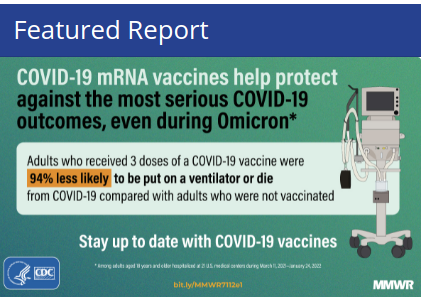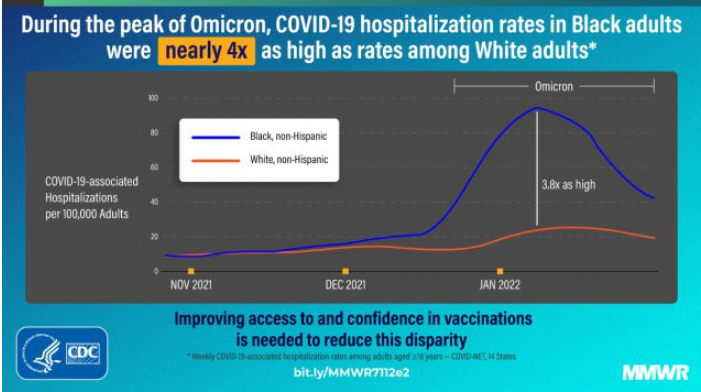#16,646
While our current crop of COVID vaccines isn't as protective against Omicron infection as we'd like, a report in yesterday's MMWR indicates 3 shots (2 initial & booster) still provides excellent protection against serious illness and death.
This finding is reassuring, but not completely unexpected, as we've seen very low hospitalization and deaths rates reported by highly-vaccinated nations (like Denmark) where Omicron has already peaked. In Hong Kong, where many of the elder eschewed the vaccine and/or booster, death rates have been noticeably higher.
We've excerpts from two related MMWR reports this morning, along with a brief statement by the CDC. First up:
Effectiveness of mRNA Vaccination in Preventing COVID-19–Associated Invasive Mechanical Ventilation and Death — United States, March 2021–January 2022
Early Release / March 18, 2022 / 71
Mark W. Tenforde, MD, PhD1; Wesley H. Self, MD2; Manjusha Gaglani, MBBS3,4; Adit A. Ginde, MD5; David J. Douin, MD5; H. Keipp Talbot, MD2; Jonathan D. Casey, MD2; Nicholas M. Mohr, MD6; Anne Zepeski, PharmD6; Tresa McNeal, MD3,4; Shekhar Ghamande, MD3,4; Kevin W. Gibbs, MD7; D. Clark Files, MD7; David N. Hager, MD, PhD8; Arber Shehu, MD8; Matthew E. Prekker, MD9; Anne E. Frosch, MD9; Michelle N. Gong, MD10; Amira Mohamed, MD10; Nicholas J. Johnson, MD11; Vasisht Srinivasan, MD11; Jay S. Steingrub, MD12; Ithan D. Peltan, MD13,14; Samuel M. Brown, MD13,14; Emily T. Martin, PhD15; Arnold S. Monto, MD15; Akram Khan, MD16; Catherine L. Hough, MD16; Laurence W. Busse, MD17; Abhijit Duggal, MD18; Jennifer G. Wilson, MD19; Nida Qadir, MD20; Steven Y. Chang, MD, PhD20; Christopher Mallow, MD21; Carolina Rivas21; Hilary M. Babcock, MD22; Jennie H. Kwon, DO22; Matthew C. Exline, MD23; Mena Botros, MD23; Adam S. Lauring, MD, PhD24; Nathan I. Shapiro, MD25; Natasha Halasa, MD2; James D. Chappell, MD, PhD2; Carlos G. Grijalva, MD2; Todd W. Rice, MD2; Ian D. Jones, MD2; William B. Stubblefield, MD2; Adrienne Baughman2; Kelsey N. Womack, PhD2; Jillian P. Rhoads, PhD2; Christopher J. Lindsell, PhD2; Kimberly W. Hart, MA2; Yuwei Zhu, MD2; Katherine Adams, MPH1; Diya Surie, MD1; Meredith L. McMorrow, MD1; Manish M. Patel, MD1; IVY Network (View author affiliations)
Summary
What is already known about this topic?
COVID-19 mRNA vaccines provide protection against COVID-19 hospitalization among adults. However, how well mRNA vaccines protect against the most severe outcomes of COVID-19–related illness, including use of invasive mechanical ventilation (IMV) or death, is uncertain.
What is added by this report?
Receiving 2 or 3 doses of an mRNA COVID-19 vaccine was associated with a 90% reduction in risk for COVID-19–associated IMV or death. Protection of 3 mRNA vaccine doses during the period of Omicron predominance was 94%.
What are the implications for public health practice?
COVID-19 mRNA vaccines are highly effective in preventing the most severe forms of COVID-19. CDC recommends that all persons eligible for vaccination get vaccinated and stay up to date with COVID-19 vaccination.
Discussion
Analysis of data on severe COVID-19 outcomes from a multistate hospital network found that receipt of 2 or 3 doses of a COVID-19 mRNA vaccine conferred 90% protection against COVID-19–associated IMV or in-hospital death among adults. Most vaccinated patients who experienced COVID-19–associated IMV or who died in hospital were older or had complex underlying conditions, commonly immunosuppression. Protection against IMV or death was consistent throughout the Delta and Omicron periods and was higher in adults who received a third vaccine dose, including 94% during the Omicron period. These findings reinforce the highly protective effects of up-to-date COVID-19 vaccination against severe illness and death among adults, including against current SARS-CoV-2 variants.
(SNIP)
Through February 2022, nearly 1 million COVID-19–associated deaths have occurred in the United States, primarily in unvaccinated persons (9). COVID-19 vaccination is likely to prevent a majority of COVID-19–associated deaths and other life-threatening outcomes. CDC recommends that all persons eligible for vaccination get vaccinated and stay up to date with COVID-19 vaccination (4).
The second MMWR report looks at the rate of COVID hospitalizations from COVID by Race/Ethnicity and vaccination status, and finds hospitalization rates in black adults (who tend to have lower vaccination rates) was nearly 4 times higher than among white adults.
COVID-19–Associated Hospitalizations Among Adults During SARS-CoV-2 Delta and Omicron Variant Predominance, by Race/Ethnicity and Vaccination Status — COVID-NET, 14 States, July 2021–January 2022
Early Release / March 18, 2022 / 71
Christopher A. Taylor, PhD1; Michael Whitaker, MPH1; Onika Anglin, MPH1,2; Jennifer Milucky, MSPH1; Kadam Patel, MPH1,2; Huong Pham, MPH1; Shua J. Chai, MD3,4; Nisha B. Alden, MPH5; Kimberly Yousey-Hindes, MPH6; Evan J. Anderson, MD7,8,9; Kenzie Teno, MPH10; Libby Reeg, MPH11; Kathryn Como-Sabetti, MPH12; Molly Bleecker, MA13; Grant Barney, MPH14; Nancy M. Bennett, MD15; Laurie M. Billing, MPH16; Melissa Sutton, MD17; H. Keipp Talbot, MD18; Keegan McCaffrey19; Fiona P. Havers, MD1; COVID-NET Surveillance Team (View author affiliations)
Summary
What is already known about this topic?
SARS-CoV-2 infections can result in COVID-19–associated hospitalizations, even among vaccinated persons.
What is added by this report?
In January 2022, unvaccinated adults and those vaccinated with a primary series, but no booster or additional dose, were 12 and three times as likely to be hospitalized, respectively, as were adults who received booster or additional doses. Hospitalization rates among non-Hispanic Black adults increased more than rates in other racial/ethnic groups.
What are the implications for public health practice?
All adults should stay up to date with COVID-19 vaccination to reduce their risk for COVID-19–associated hospitalization. Implementing strategies that result in the equitable receipt of COVID-19 vaccinations among persons with disproportionately higher hospitalizations rates, including non-Hispanic Black adults, is an urgent public health priority.
The CDC issued the following statement on these two MMWR reports yesterday.
COVID-19 vaccines continue to protect against hospitalization and death among adults
Media Statement
For Immediate Release: Friday, March 18, 2022
Contact: Media Relations
(404) 639-3286
COVID-19 vaccines continue to protect against hospitalization and death among adults
COVID-19 vaccination continues to help protect adults against severe illness with COVID-19, including hospitalizations and death, according to two reports released in today’s MMWR.
During Omicron, COVID-19-associated hospitalization rates increased for all adults, regardless of vaccination status, but rates were 12 times higher among adults who were unvaccinated compared to adults who received a booster or additional doses. Hospitalization rates were also highest among non-Hispanic Black adults and nearly 4 times as high among Black adults than White adults during the peak of Omicron.
Additionally, mRNA vaccines continued to be highly effective at protecting against COVID-19-associated ventilation or death, including during the Omicron period. Protection was highest in adults who received a third vaccine dose, reducing the risk for COVID-19-associated ventilation or death during the Omicron period by 94%.
CDC continues to recommend that everyone 5 years and older stay up to date on their COVID-19 vaccines, including a booster dose for those who are eligible. We also must work to ensure everyone has equitable access to vaccines and treatments by focusing efforts on reaching people who have been disproportionately affected, so that they can be protected from the effects of the virus, including severe illness, hospitalization, and death.
Our current vaccine - which was based on the original Wuhan strain of SARS-CoV-2 - isn't as effective against newer variants as it once was, and will likely need updating in the months ahead. But it still provides valuable protection against severe illness.
There remains a large segment of society who - despite the evidence - are still hesitant to get the COVID vaccine (or booster).
Although there is no such thing as a 100% safe or benign vaccine, COVID vaccines have an excellent safety profile, and have undoubtedly prevented hundreds of thousands of deaths in the United States alone.
I'm certainly glad I got mine, and if COVID continues to circulate, I won't hesitate to get a 4th shot when the time is right.

